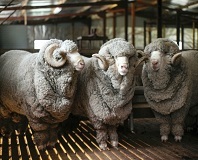Read the latest information on
Foot-and-mouth disease
 As sheep breeding season approaches, so does the threat of ovine brucellosis (OB), an infectious disease that can affect all sheep breeds and cause considerable economic loss for producers.
As sheep breeding season approaches, so does the threat of ovine brucellosis (OB), an infectious disease that can affect all sheep breeds and cause considerable economic loss for producers.
Causing inflammation of the male reproductive organs, OB can result in infertility in some affected rams and in some cases, has been associated with abortion and increased perinatal mortality in ewes, said Dr Rob Barwell, Animal Health Australia’s Senior Manager, Biosecurity.
“This can result in ram wastage, low lamb-marking percentages and extended lambing periods, which can have a significant impact on a producer’s bottom line,” said Dr Barwell.
“Unfortunately, it can be hard to spot the condition in your flock, as infected rams typically do not show signs of ill-health. That’s why it’s important that producers keep OB front of mind before breeding season and take the necessary precautions to avoid introducing the condition onto their property.”
One of these precautions is always using a Sheep Health Declaration (SHD) when buying, selling or agisting sheep.
“The SHD provides information to buyers on whether sheep are from an OB accredited flock, allowing producers to assess the risk before proceeding with the purchase,” said Dr Barwell.
“Producers should always insist on an SHD when purchasing new stock – not only does it provide information on OB accreditation but also whether diseases such as virulent footrot and Johne’s disease are present in the sheep you’re looking to buy. The SHD is the most important disease risk management tool available to producers.”
On-farm biosecurity practices are another line of defence in preventing OB from entering your flock.
“Implementing good on-farm biosecurity measures, such as having good boundary fences to minimise the risk of stray rams having any contact with your flock, is another way you can prevent OB coming onto your property,” said Dr Barwell.
“If you suspect the disease may be present in your flock, contact your veterinarian to investigate and confirm it with blood tests. Once you know if OB is in your flock, you can then take steps to manage it and reduce its economic impact.”
For more information about improving the health of your sheep flock and good on-farm biosecurity practices, visit the Sheep industry page on the Farm Biosecurity website, or download the SHD here.